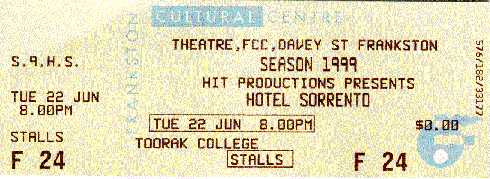HOTEL SORRENTO - RAYSON
 Hotel Sorrento by
Hannie Rayson has been described as Chehovean in its power and poignancy. You may want to
look at the notes for the Chekhov play 'The
Cherry Orchard', if you'd like to familiarise yourself with the kinds of traits the
Russian playwright he is famous for.
Hotel Sorrento by
Hannie Rayson has been described as Chehovean in its power and poignancy. You may want to
look at the notes for the Chekhov play 'The
Cherry Orchard', if you'd like to familiarise yourself with the kinds of traits the
Russian playwright he is famous for.
A review of the film version of the play from the Techno Culture Home Page Do you agree with
the conclusions? Are they also evident in the play itself?
ABOUT THE FILM HOTEL SORRENTO
Director: Richard Franklin
Starring: Caroline Goodall, Caroline Gillmer, Tara Morice,
Joan Plowright
Rating: **
This screen adaptation of Melbourne author Hannie Rayson's
play of the same name has some shining moments that reveal director Richard Franklin's
talent for bringing out the warmth and naturalness of his stable of actors. Though the
film does suffer from some unrealistic dialogue and technically stilted camera work, most
audiences will probably find it more moving and accessible than most of the big-budget
films on the market at the moment.
Set in the Victorian coastal town of Sorrento, the film
brings together three sisters whose lives have briefly come together again under
circumstances that force them to examine the unspoken sibling rivalry present in the bonds
of love that tie them together.
The catalyst for this familial soul-searching is middle
sister Meg's (Caroline Goodall) best-selling novel, Melancholy, a thinly disguised
autobiography which reveals a bit more of the Moynihan sisters' lives than Hilary
(beautifully acted by Caroline Gillmer) or the younger Pippa (Tara Morice) would care to
bare. Both the book and the reunion - which also brings together the males in the Moynihan
women's lives - are marked with events that serve to cnge the fabric of the family, for
better or worse but most certainly (and in some cases tragically) forever.
Providing a gentle counterpoint to the Moynihan's troubles
is Marge Morrisey, played with warmth and subtlety by veteran actress Joan Plowright. She
softens the bitterness felt by Hilary - the one sister who never left Sorrento - and adds
an element of gentle resignation and humour to some of the harsher circumstances that rise
to meet the Moynihans during what may turn out to be their last summer in Sorrento.
Even the generally fine performances, however, cannot
overcome some awkward moments in Hotel Sorrento; too often the dialogue resembles
bits of clever dinner party conversations strung together, making the characters seem
two-dimensional and utterly lacking sufficient development to justify some of their
behavior. Technically the film suffers as well - at times the camera seems to lurch around
the set, giving the film an overly-staged feel and distracting the viewer to the point of
irritation.
In it's favour, Hotel Sorrento does not opt out for
easy resolutions or over-obvious conclusions to the Moynihan's problems. The trouble with
the film is that the people and the problems never quite seem real, making Hotel Sorrento
a warm but skewed film that never quite settles within the bounds of reality.
About Hannie Rayson
Major Credits & Experience
Stage
Please Return to Sender 1980
Mary 1981
Leave It Till Monday 1984
Room To Move 1985
Hotel Sorrento 1990
Falling From Grace 1994
Scenes From A Separation 1995
Competitive Tenderness 1996
Television
Sloth - Episode of The Seven Deadly Sins ABC TV 1991
Awards & Prizes
AWGIE - Best Play, Room To Move 1986
Green Room Award - Best Play, Hotel Sorrento 1990
AWGIE - Best Play, Hotel Sorrento 1990
N.S.W. Premier's Literary Award, Hotel Sorrento 1990
The Age Performing Arts Award -Best Play, Falling From Grace 1995
N.S.W. Premier's Literary Award, Falling from Grace 1995
The Sidney Myer Performing Arts Award 1995


 Hotel Sorrento by
Hannie Rayson has been described as Chehovean in its power and poignancy. You may want to
look at the notes for the Chekhov play 'The
Cherry Orchard', if you'd like to familiarise yourself with the kinds of traits the
Russian playwright he is famous for.
Hotel Sorrento by
Hannie Rayson has been described as Chehovean in its power and poignancy. You may want to
look at the notes for the Chekhov play 'The
Cherry Orchard', if you'd like to familiarise yourself with the kinds of traits the
Russian playwright he is famous for.
